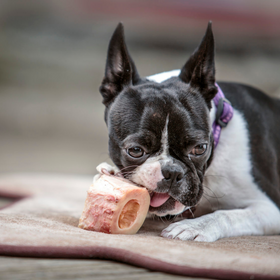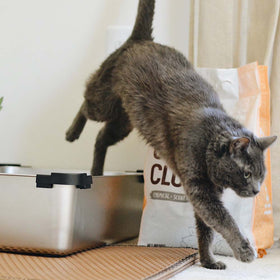
The Impact of Carbs on Your Dog’s Pancreas: What You Need To Know
Research from 2011 brought new insights into the link between diet and pancreatic health. When it comes to the pancreas, many pet parents automatically think of fat being the issue, but a study comparing raw vs. dry (kibble) diets in Staffordshire Bull Terriers highlighted the role of amylase, an enzyme responsible for digesting carbohydrates, and how too many carbs might lead to pancreatic stress in dogs.
Amylase: What Is It and What Does It Do?
Amylase is an enzyme that helps carbohydrates break down into sugars, which are then absorbed and used for energy. In humans, amylase is produced in the saliva, allowing us to begin the digestion of carbohydrates right in our mouths. But dogs are different.
Dogs do produce amylase, but not in their saliva, and they don’t produce nearly as much of it as humans do. Their bodies aren’t designed to handle the amount of carbohydrates found in kibble, which means when they consume a high-carb diet, the pancreas has to pick up the slack by producing more amylase to help digest those carbs.
What the Study Revealed
In the study, dogs fed a dry, high-carb diet showed increased amylase levels, indicating their pancreas was working harder to break down those carbohydrates. This extra work places a strain on the pancreas, and over time, this stress can lead to serious conditions, like pancreatitis, an inflammation of the pancreas that can cause pain and digestive issues and can lead to life-threatening complications.
In contrast, dogs fed a raw, high-fat diet did not show these elevated amylase levels, suggesting that a diet closer to what their digestive systems are designed to process—food that’s higher in protein and fat, and lower in carbs—puts less stress on the pancreas and may support better overall health.
What Does This Mean for Your Dog?
This study underscores the importance of choosing the right diet—one that aligns with their biology.
Here are a few practical steps you can take to keep your dog’s pancreas healthy:
- Choose a high-protein, low-carb diet: Opt for raw or minimally processed food that’s rich in meat, healthy fats, and fibre, with minimal carbohydrates. This aligns more closely with what dogs evolved to eat.
- Avoid foods with high starch content: Stay away from foods with high levels of grains, potatoes, or other starches. These are more difficult for dogs to digest and put extra pressure on the pancreas.
- Consider fresh, whole foods: Raw diets or fresh, gently cooked meals can provide more natural, bioavailable nutrients without the excess carbs found in processed kibble.
Final Thoughts
The pancreas plays a vital role in your dog’s overall health, and feeding them a diet that’s too high in carbs can put unnecessary strain on this important organ. As the study suggests, feeding dogs a more natural protein- and fat-focused diet can help support pancreatic health and reduce the risk of conditions like pancreatitis.
At Wholesome Canine, we’re passionate about promoting natural, healthy diets that are best suited to your dog’s needs. If you’re ready to make a change and explore options that are better for your dog’s pancreas—and their overall health—let us help you find the right food for your pup. Your dog deserves a diet that works with their body, not against it.









